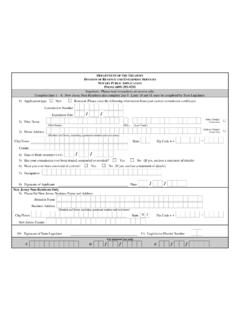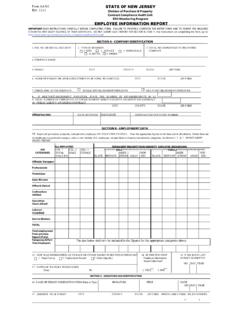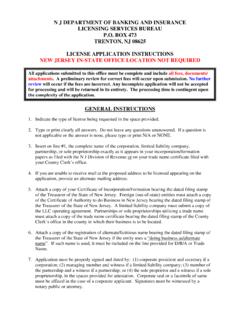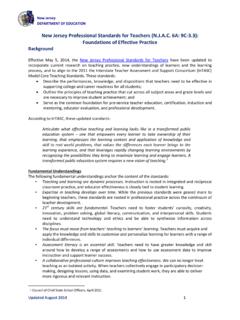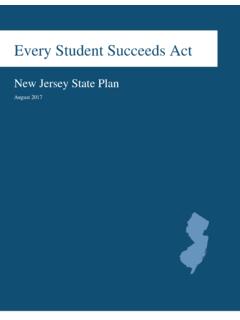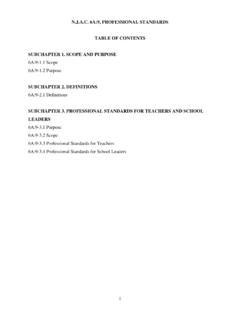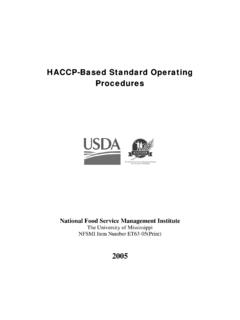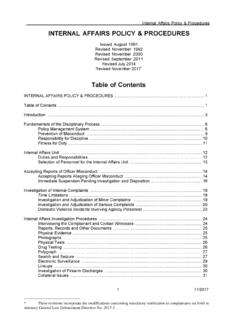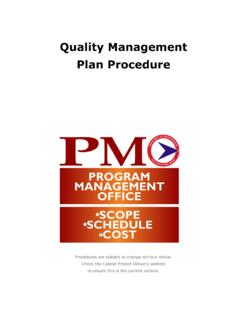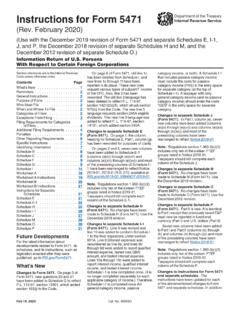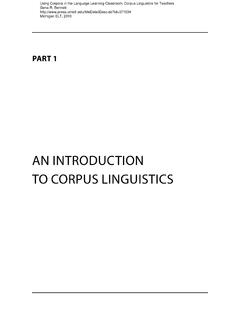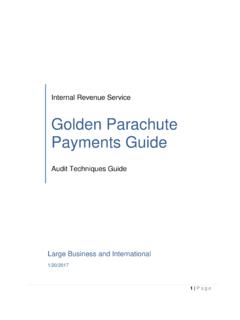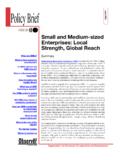Transcription of 2021 NJ-CBT-1065 Instructions
1 GIT & CBT Partnership Returns For 2017 The Division has two partnership tax returns, Forms NJ-1065 and NJ-CBT-1065 . The Gross Income Tax Act (GIT) at 54A:8-6 requires entities classified as a partnership for federal income tax purposes having a resident owner or income derived from New Jersey sources to file a Gross Income Tax return, Form NJ-1065. Partnerships with more than two (2) owners and income or loss from New Jersey sources may also be subject to a filing fee. The fee will now be computed and reported on Form NJ-1065.
2 The Corporation Business Tax Act (CBT) at 54 imposes a tax on certain partnerships that have nonresident owners. Partnerships subject to the CBT tax must file Form NJ-CBT-1065 . The separate forms help distinguish the differences that exist between the Gross Income Tax and Corporation Business Tax Acts. The filing fee is reported directly on Form NJ-1065. The GIT filing fee is remitted with the Partnership Payment Voucher (NJ-1065-V). If the entity is also required to compute and report Corporation Business Tax, the entity must complete and file Form NJ-CBT-1065 .
3 If the entity has a CBT balance due, it is remitted with the Corporation Business Tax-Partnership Payment Voucher (NJ-CBT-V). 2_____ 2017 Form NJ-CBT- 1065 _____ General Instructions Partnership Defined For tax purposes partnership means and shall include a syndicate, group, pool, joint venture and any other unincorporated organization through or by means of which any business, financial operation or venture is carried on and which is not a corporation, trust or estate within the meaning of the New Jersey Gross Income Tax Act.
4 Only entities that qualify for and elect to be treated as a partnership for Federal tax purposes (for example limited liability companies and limited liability partnerships) shall be treated as partnerships under the New Jersey Gross Income Tax Act. Tiered Partnerships are arrangements wherein one partnership, the upper-tier or parent partnership, is a member of, or holds an ownership interest in another partnership (called the lower-tier, or subsidiary partnership).
5 Tiered partnerships must complete Schedule A, Form NJ-1065 before completing Lines 1 through 11 on the front of Form NJ-1065. Partner Defined Partner means any owner of a part-nership interest. Nonresident Noncorporate Partner means an individual, an estate or a trust subject to taxation pursuant to the New Jersey Gross Income Tax Act that is not a resident taxpayer or a resident estate or trust under that act. Nonresident Corporate Partner means a partner that is not an individual, an estate or a trust subject to taxation pursuant to the New Jersey Gross Income Tax Act that is not a corporation exempt from tax pursuant to 54:10A-3 and that does not maintain a regular place of business in this State other than a statutory office.
6 Qualified Investment Partnership means a partnership that has more than 10 members or partners with no member or partner owning more than a 50% interest in the entity and that derives at least 90% of its gross income from dividends, interest, payments with respect to securities loans, and gains from the sale or other disposition of stocks or securities or foreign currencies or commodities or other similar income (including but not limited to gains from swaps, options, futures or forward contracts)
7 Derived with respect to its business of investing or trading in those stocks, securities, currencies or commodities, but investment partnership shall not include a dealer in securities within the meaning of section 1236 of the Federal Internal Revenue Code of 1986. Hedge Fund Status is met for New Jersey tax purposes if the investment entity's only activity is the purchase, holding or sale of intangible personal property, such as commodities or securities and such intangible personal property is not held for sale to customers as defined at 54A:5-8c.
8 A partnership that qualifies for hedge fund status in one year may not meet the requirements every year. The entity must evaluate its situation on a yearly basis. The entity, not the partner, must make the determination. Investment Clubs are usually small groups of individuals who pool their money to invest in stock or other securities. The group usually operates informally with members pledging to pay a regular amount into the club monthly.
9 Some clubs have a committee that gathers information on securities, selects the most promising securities, and recommends that the clubs invest in them. Most clubs require all members to vote for or against all investments, sales trades, and the other transactions. Investment clubs recognize as their main source of income interest, dividends, and gains on disposition of their stock and securities and usually meet hedge fund status. Investment clubs generally are not considered a business.
10 An investment club is required to file a New Jersey Partnership Form NJ-1065 but is not entitled to deduct any expenses (unless it rises to the level of being in business). The member or partner of the investment club will report their share of the investment club's income or loss as "distributive share of partnership income". If an investment club meets the following criteria, it will be exempt from the $150 per owner annual partnership filing fee and from the requirement that a partnership make payments on behalf of its nonresident owners.
